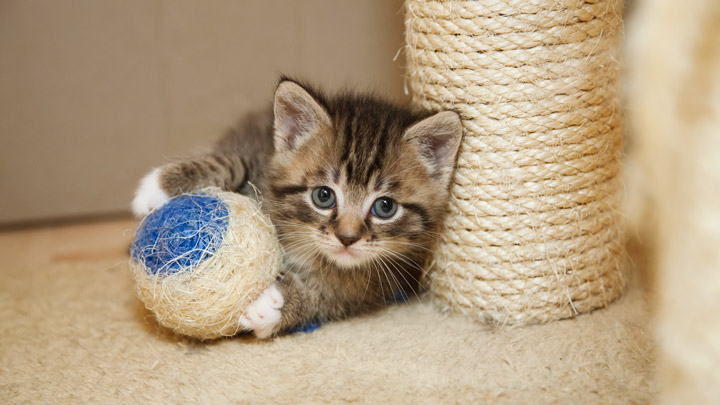How To Stop Your Cat Scratching Your Furniture
Cats really do love to scratch but while it’s great for them it’s not so good for you and your furniture. In fact, it can be downright frustrating - as much as you love your feline friend, the last thing you want is a frayed sofa or shredded curtains. Fortunately, there’s plenty you can do to encourage your cat away from your possessions and onto their own scratching post.

Why do cats scratch furniture and carpets?
As a human you might well wonder why your cat is constantly scratching, but for them it’s completely normal and there are several reasons why:
- Exposing new claws – Cats use their claws for hunting and climbing so it’s essential they keep them in good condition. Scratching is a natural way to remove old and worn claws to expose new sharp ones. If your cat has limited time outside, then they’ll do this grooming in your home
- Marking territory – Cats have scent glands between their paw pads so when they scratch, they leave a unique smell on the ground
- Habit – Some cats develop a habit of scratching indoors. They may like the texture of your curtains or carpet, or it may be a show of excitement before playtime
- Communication – Cats will scratch to communicate when other cats are around. It’s not always clear why they scratch more but it may be to mark their territory, or because of increased anxiety. If windows or doors are particularly damaged it could be because of the presence of another cat close by
- Boredom or attention seeking – Scratching might start accidentally – a frayed curtain, a loose piece of wallpaper which catches their eye – but it can also be a method to attract your attention
How to stop cats scratching furniture
Your cat’s going to scratch whether you want them to or not. It’s not so much a question of stopping them scratching, as encouraging them to scratch things you don’t mind being damaged.
- Choose a good scratching post – A scratching post is the perfect piece of furniture to let your cat scratch, particularly if they’re a house cat or they’ve developed the habit of scratching indoors. Ideally provide several different scratching posts, including natural wood where possible. Rubbing catnip on the surface can encourage your cat to use the post rather than another household object
- Exercise – Make sure your cat gets enough exercise. Give them a selection of toys and play with them for periods throughout the day to reduce boredom
- Help them feel secure – Often cats scratch because they feel insecure and you’ll need to identify what is making them anxious. This could be another cat, which can be particularly stressful for your pet if they’re coming into your home. Consider electronic cat flaps or let your cat in and out yourself. You can also rub their cheek or paws on furnishings to spread their scent and help them feel relaxed
How to stop cats scratching carpets
Some cats prefer horizontal scratching which is bad news for your flooring. Instead of scratching posts, lay mats around your home and put toys on top to encourage them to scratch there instead.

Tips to encourage your cat to use a scratching post
Your cat may ignore their new scratching post at first but with a few tweaks they’ll soon change their mind:
- Buy a good quality post that doesn’t wobble as this may put them off
- Make sure the post is tall enough so they can stretch all the way up
- Place the post in front of their favourite scratching spot to encourage them
- Rub their cheeks or paws on the post to spread their scent or transfer their scent using a towel or cloth
- Add other surfaces for them to scratch and make it interesting – think bark, fabric offcuts and bits of paper
How to keep cats calm and stress-free
Just like humans, cats can become stressed and unsettled – they may become more withdrawn, eat or drink less, pace more, hiss or growl, suffer disturbed sleep, react badly to people and of course, scratch more.
But there are things you can do to keep them calm such as give them space, handle them less if they’re not keen and take steps to keep out cat intruders. Make sure your cat has everything they need and prepare them for changes before they happen.
How to keep cats occupied
Cats love games so playing with them regularly will alleviate any boredom. Similarly, inventing new games for them or changing toys regularly can help. Create cubby holes and elevated spaces for your cats to hide in and even consider playing fetch with them using screwed up balls of paper or small toys – just like dogs, some cats love to retrieve items and bring them back to their owner.
What if my cat still won’t stop scratching the carpet or furniture?
Sometimes, no matter what you do a cat simply has their favourite spot. You can try washing the scratched area to remove as much smell as possible. A mild detergent might be enough to create a scent they really don’t like. Cats aren’t immune to a spot of bribery either so you can encourage them to use a scratching post instead with some carefully timed treats.

What to do if you spot changes in your cat’s scratching behaviour
Your cat’s behaviour may change if they’re feeling anxious or stressed so you’ll need to identify what’s upsetting them. Look at their environment – has there been a change in daily routine, have you introduced a new pet, have you bought new furniture, is there another cat in the area? These are all things which might trigger a change in behaviour and you’ll need to address them to reduce the level of scratching:
- Create a daily routine
- Increase play times
- Add interesting items to reduce boredom
- Use anti-scent sprays if necessary
If your cat still won’t stop scratching, consider a trip to the vet to look for any underlying causes.

Medivet Healthcare Plan
On average our clients save an average of £225 with the Medivet Healthcare Plan.
Learn more


